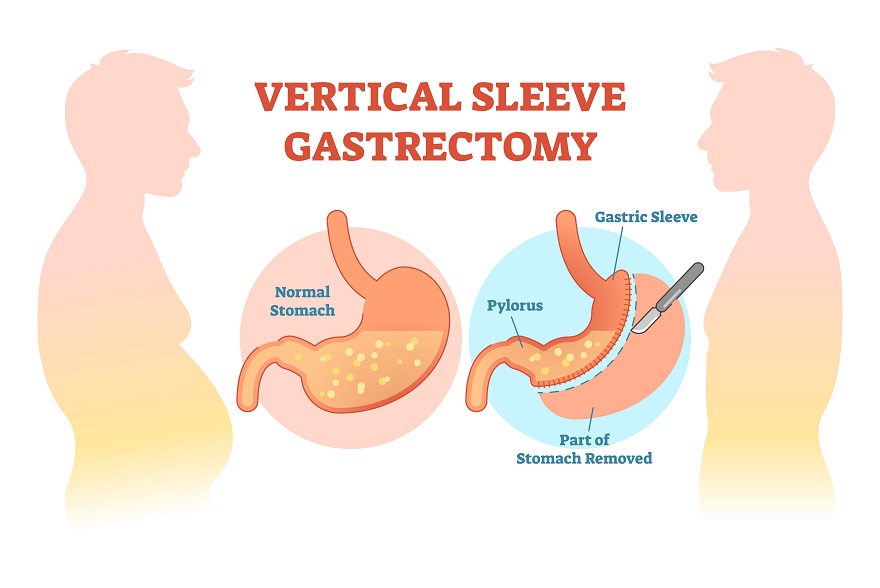If you’re considering Vertical Sleeve Gastrectomy (VSG) as a weight-loss solution and are also planning for pregnancy, you’re not alone. Many women who undergo bariatric surgery have questions about how it may impact their fertility and what effect it could have on pregnancy. At Tampa Weight Loss Institute, under the expert guidance of Dr. Amit Taggar, we’re here to provide clear, evidence-based insights and support as you navigate this important journey. Here’s what you need to know about pregnancy after VSG, and how we can help you achieve your goals for both fertility and a healthy pregnancy.
Vertical Sleeve Gastrectomy, or VSG involves removing about 80% of the stomach, leaving a sleeve-like structure. This drastically reduces the stomach’s capacity, making it easier to feel full with smaller portions. As a result, most patients experience significant and sustainable weight loss. It improves your overall health, including lowering the risk of type 2 diabetes, high blood pressure, and sleep apnea.

Losing excess weight through bariatric surgery, like VSG, can have a significant positive impact on fertility. Obesity can cause hormonal imbalances, insulin resistance, and irregular menstrual cycles, all factors that can impair your ability to conceive. Fortunately, studies show that weight loss surgery can help correct these imbalances and improve fertility.
Research published in Journal of Clinical Endocrinology & Metabolism suggests that women who undergo bariatric surgery are more likely to conceive within a year of surgery. Many women who struggled with infertility due to obesity find that their fertility improves after weight loss (Legro et al. (2007).
While VSG can enhance fertility and help you achieve your pregnancy goals, there are a few important factors to keep in mind:
Pregnancy after VSG can be a healthy and rewarding experience when properly planned. Here are the key points to keep in mind:
While this article is focused on pregnancy after VSG, it’s also helpful to be aware of the common changes and adjustments your body may experience after surgery. Most patients do incredibly well, especially with the right support and follow-up care. If you’d like to better understand what to expect in the months and years after surgery—from nutritional needs to possible digestive changes—visit our guide on vertical sleeve gastrectomy complications and conditions after treatment. It’s all about helping you stay informed and empowered on your journey.
Dr. Amit Taggar and the Tampa Weight Loss Institute team specialize in personalized care, ensuring that your weight loss journey is optimized for better reproductive health. If you’re struggling with infertility due to excessive weight, bariatric surgery might just be the solution to give you a better chance at conception.
Our team is here to guide you through every step of your weight loss journey, ensuring that you’re fully supported as you prepare for motherhood.
Call us today for more information or to book your consultation. Let’s work together to help you achieve the healthy, fulfilling pregnancy you wished for!
-Disclaimer-
The information provided on this website is for educational and informational purposes only and is not intended as medical advice. Always consult with a qualified healthcare provider regarding any medical concerns, conditions, or treatment options. Individual results may vary. The services described are not intended to diagnose, treat, cure, or prevent any disease. Any medical procedure should be discussed thoroughly with a licensed professional before beginning treatment.

Dr. Amit Taggar is a board-certified, fellowship-trained bariatric surgeon and the founder of Tampa Weight Loss Institute. Recognized globally for his expertise in robotic weight loss surgery, Dr. Taggar specializes in Roux-en-Y gastric bypass, vertical sleeve gastrectomy, duodenal switch, and complex bariatric revisions. He has trained surgeons from around the world and performed live surgical demonstrations at major international conferences.
Committed to empowering patients on their weight loss journey, Dr. Taggar emphasizes a comprehensive approach to long-term success, integrating advanced surgical techniques with personalized aftercare. At Tampa Weight Loss Institute, he leads a team dedicated to transforming lives through compassionate, patient-centered care.